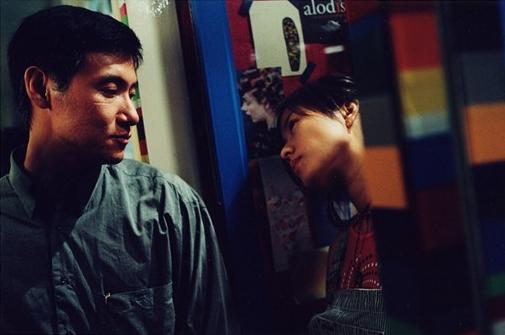 Jackie Cheung plays Lam, a literature teacher who has a lustful admirer in the form of his pupil Wu, played by Karina Lam. Despite his own understandable misgivings, Lam concedes that he has also developed a thing for Wu. Meanwhile it turns out that Lam’s wife, played by Anita Mui (also mother to their three sons) has a dark secret which is dragged to the surface when her school old teacher becomes ill with cancer.
Jackie Cheung plays Lam, a literature teacher who has a lustful admirer in the form of his pupil Wu, played by Karina Lam. Despite his own understandable misgivings, Lam concedes that he has also developed a thing for Wu. Meanwhile it turns out that Lam’s wife, played by Anita Mui (also mother to their three sons) has a dark secret which is dragged to the surface when her school old teacher becomes ill with cancer.
The interplay between young female student and teacher on the verge of a midlife crisis is played out in a way which like The Postmodern Life of My Aunt (2006) (also part of the Visible Secrets season) is observational rather than judgmental. Despite putting his marriage and his relationship with his three sons on the line at every turn Jackie Cheungs character, Lam is never portrayed in a negative light. As a viewer it is easy to see why Lam is drawn into the world that Wu represents, it is not just the idea of getting it on with a teenager that attracts Lam; it is the feeling of what it was once like to be young and free of responsibility. There is a link clearly drawn between the classical poetry of Li Bai which Lam preaches on a daily basis and the emotional ride he has been drawn into. Romantic images of the Yang Tze river crop up occasionally; however Lam is limited to watching images of the river on grainy VHS tapes, perhaps longing to escape the imposing gray of the city. The seductive Wu offers an escape from this world. Karena Lam plays the part of Wu to perfection, and incidentally was to scoop most of the awards that the movie went on to receive including best supporting actress and best new comer at the Hong Kong Film Awards and Golden Horse respectively. However, I genuinely feel that it was the older performers that truly acted like gods.
Usually when I think of Jackie Cheung it is his performance as a street fighting youth in John Woo’s Bullet In The Head (1990), yet a mere 12 years later, here he is playing almost the opposite. Indeed one criticism might be that he is too young at 41 to play such a character and the dynamic between teacher and young student might be dramatically increased with an older actor. Cheung plays the part however with a restrained verve worthy of merit; you can see in his eyes the guilt and the self doubt, yet in the same breath you can tell he is a character blinded by his affections. The fact that Cheung had just come out of a five year hiatus from the movie scene (his previous film being High Risk (1996)!) says a lot about the faith he had in the script and in Ann Hui’s capable direction.
Speaking of direction, as with The Postmodern Life of My Aunt, July Rhapsody is awash with simple yet striking directorial notes. There is a shot of Lam’s hand, close to Wu’s naked leg as they are sat in the cinema; the wedding ring on show is a clear indication of the risk involved. That said I’m sure there are many doting Anita Mui fans out there that would consider it no contest at all.
Speaking of Anita Mui, she plays more of a background role until the final third of the movie when she struggles with her thoughts about her dying former teacher. We can read into her performance the impending doom of the relationship; as if she is in denial, at the same time she harbours a secret that could, like the actions of a cheating spouse, destroy the fragile family unit. It is at this point that Mui’s performance also steps up a gear. She plays with sensitivity a character traumatized by the past and future, it is not the crocodile teared comedic Anita Mui that we saw with say Jackie Chan in Miracles (1989), instead this is the real deal, the actress at work.
In conclusion, considering that Jackie Cheung and the late, great Anita Mui are better known in the east for singing careers, it half surprised me that they didn’t burst into some kind of duet. Thankfully they didn’t as it might have killed the mood; instead we get two of the most finely honed acting performances in Hong Kong cinema history.
[Ed. Note; Podcast on Fire has taken the plunge into providing movies reviews from various Festivals across the United Kingdom. Full credit to Lantern Jaw for attending Visible Secrets]














